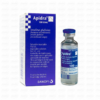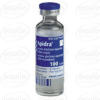The 2x Referral Bonus Event Is Now On! More Info ➡️
SAVE 10% OFF First Order With Coupon Code: WELCOME10


Our Price: $59.99

Step 1
Place Your Prescribed Apidra Vials Dosage In Your Cart
Step 2
Complete Checkout
Step 3
Upload Your Apidra Vials Prescription
(Shipping takes approximately 4-10 business days. A tracking number will be provided)
Apidra Vials can cause severe hypoglycemia, which can result in seizures, unconsciousness, and death. Patients should be closely monitored for signs of hypoglycemia, and their insulin dosage should be carefully adjusted. The medication should only be used under the supervision of a healthcare provider.
Insulin pens and needles must never be shared between patients, even if the needle is changed. Do NOT reuse needles, as this can cause severe consequences.
Monitor blood glucose in all patients treated with insulin. Modify insulin regimens only under medical supervision. Changes in insulin regimen, including strength, manufacturer, type, injection site, or method of administration, may result in the need for a change in insulin dose or an adjustment in concomitant oral antidiabetic treatment. Dosing should be individualized based on patient characteristics and lifestyle.
Repeated insulin injections into areas of lipodystrophy or localized cutaneous amyloidosis may result in hyperglycemia; the sudden change in the injection site (to the unaffected area) has been reported to result in hypoglycemia. Advise patients to rotate injection site to unaffected areas and closely monitor for hypoglycemia.
Hypoglycemia is the most common adverse reaction associated with insulins, including Apidra, and maybe life-threatening.
To avoid medication errors between Apidra and other insulins, instruct patients to check the insulin label before each injection.
All insulin products, including Apidra, can cause hypokalemia. Untreated hypokalemia may cause respiratory paralysis, ventricular arrhythmia, and death. Use caution in patients who may be at risk for hypokalemia.
Severe life-threatening, generalized allergy, including anaphylaxis, can occur with insulin products, including Apidra. If hypersensitivity reactions occur, discontinue Apidra, treat per standard of care, and monitor until symptoms and signs resolve.
Fluid retention and heart failure can occur with concomitant use of thiazolidinediones (TZDs) with insulin. Observe for signs and symptoms of heart failure. Consider dosage reduction or discontinuation of TZD if heart failure occurs.
Malfunction of the insulin pump or insulin infusion set or insulin degradation can rapidly lead to hyperglycemia and ketoacidosis. Patients using insulin infusion pump therapy must be trained to administer insulin by injection and have alternate insulin therapy available in case of pump failure.
Common side effects include: low blood sugar (hypoglycemia), dizziness or light-headedness, swelling, sweating, headache, confusion, blurred vision, slurred speech, irritability or mood changes, hunger, shakiness, increase heartbeat, anxiety, weight gain, allergic reactions, skin irritations at the site of injection.
Contact a doctor immediately if you are experiencing any of these severe side effects: heart failure, rash covering the entire body, shortness of breath, fast pulse, sweating, feeling faint.
Your doctor should monitor your health closely, including if you are experiencing hypoglycemia (low potassium levels) or taking TZD’s with Apidra.
Bring a list of your current prescription drugs, herbal remedies, and vitamins you are currently taking when you visit your doctor.
Do not use Apidra if you have an allergy to insulin glulisine or are susceptible to low blood sugar reactions (see allergic reactions tab for more information)
Do not share syringes, pens, or needles even if it has been changed. This can result in spreading severe infections. Do not reuse needles.
Change injection sites to reduce causing skin irritations, localized cutaneous amyloidosis (skin with lumps), or lipodystrophy (thickened or pitted skin). If lumpy, pitted, tender, bruised, scaly, thickened, stiff, or damaged, do not inject insulin medication in the same spot.
If you have any medical conditions such as kidney, liver, or heart problems or are pregnant, planning or breastfeeding, advise your doctor before starting Apidra (see pregnancy tab for more information).
Advise your doctor if you take other medications, herbal remedies, supplements, vitamins, or OTC medicines.
Suppose you are taking this medication along with TZD’s (thiazolidinediones). In that case, heart failure can occur even if you have never had any history of heart failure or cardiovascular issues in the past.
Do not change the type of insulin or dosage without consulting your doctor first. All changes should be made with supervision by a medical expert.
If you are currently using Apidra insulin, you should carry personal identification that states you have diabetes. Keep an extra supply of insulin, syringe, and needle.
Your doctor may stop or alter your drug regimen if you are experiencing any symptoms, including: heart failure, sudden weight gain, swelling of ankles or feet, shortness of breath.
Check the label on your insulin before use to ensure it’s the correct brand and type. Do not use if the substance contains particles or is clear/colorless.
Do not operate any heavy machinery or drive after using Apidra until you understand how your body reacts to it.
Always check insulin label before administration and inspect visually for particulate matter and discloration. Only use the medication if the solution appears clear and colorless.
Practice injection technique before initiating.
Apidra may be administered by subcutaneous injection, by continuous subcutaneous infusion (insulin pump), or intravenously/
DO NOT administer Apidra intramuscularly.
Severe, life-threatening, generalized allergy, including anaphylaxis, may occur with any insulin, including Apidra. Generalized allergy to insulin may cause whole body rash (including pruritus), dyspnea, wheezing, hypotension, tachycardia, or diaphoresis.
In controlled clinical trials up to 12 months duration, potential systemic allergic reactions were reported in 79 of 1833 patients (4.3%) who received Apidra and 58 of 1524 patients (3.8%) who received the comparator short-acting insulins. During these trials, treatment with Apidra was permanently discontinued in 1 of 1833 patients due to a potential systemic allergic reaction.
Available pharmacovigilance data have not established an association with insulin glulisine use during pregnancy and major birth defects, miscarriage or adverse maternal or fetal outcomes. There are risks to the mother and fetus associated with poorly controlled diabetes in pregnancy. Animal reproduction studies have been conducted with insulin glulisine in rats and rabbits using regular human insulin as a comparator. Insulin glulisine was given to female rats throughout pregnancy at subcutaneous doses up to 10 units/kg/day (2 times the average human dose, based on body surface area comparison) and to rabbits during organogenesis at subcutaneous doses up to 1.5 units/kg/day (0.5 times the average human dose, based on body surface area comparison). The effects did not differ from those observed with subcutaneous regular human insulin.
The estimated background risk of major birth defects is 6% to 10% in women with pre-gestational diabetes with an HbA1c >7 and has been reported to be as high as 20% to 25% in women with an HbA1c >10. The estimated background risk of miscarriage for the indicated population is unknown. In the U.S. general population, the estimated background risk of major birth defects and miscarriage in clinically recognized pregnancies is 2% to 4% and 15% to 20%, respectively.
Available data from published literature suggest that human insulin products, including Apidra, are transferred into human milk. There are no adverse reactions reported in the breastfed infants in the literature. There are no data on the effects of exogenous human insulin products, including Apidra, on milk production. The developmental and health benefits of breastfeeding should be considered along with the mother’s clinical need for Apidra and any potential adverse effects on the breastfed infant from Apidra or from the underlying maternal condition.
When given intravenously, excess insulin may cause hypoglycemia and hypokalemia. Hypoglycemia can usually be treated with oral glucose in mild cases. Meal patterns, exercise, and dose adjustments may be necessary.
In severe hypoglycemic episodes accompanied by coma, seizures, or neurologic impairment, glucagon or concentrated intravenous glucose may be administered intramuscularly or subcutaneously. It may be necessary to continue carbohydrate consumption and observation even after clinical improvement if hypoglycemia returns. Correct hypokalemia if necessary.
As a result of hypoglycemia or hyperglycemia, for example, or as a consequence of visual impairment, the patient’s ability to concentrate and react may be affected. These abilities may pose a risk in situations where they are of special importance (e.g., when driving a car).
It is critical to advise patients to avoid hypoglycemia while driving. This is especially relevant for people who are not aware of the warning signs of hypoglycaemia or who experience hypoglycaemia frequently. It may be prudent to avoid driving when hypoglycaemia is present.
Dispense in the original sealed carton with the enclosed Instructions for Use.
Do not use after the expiration date (see carton and container).
Unopened Apidra vials should be stored in a refrigerator, 36°F–46°F (2°C–8°C). Protect from light. Apidra should not be stored in the freezer and it should not be allowed to freeze. Discard if it has been frozen.
Unopened vials not stored in a refrigerator must be used within 28 days.
Opened vials, whether or not refrigerated, must be used within 28 days. If refrigeration is not possible, the open vial in use can be kept unrefrigerated for up to 28 days away from direct heat and light, as long as the temperature is not greater than 77°F (25°C).
Insulin and medications has becoming more and more expensive in the United States. Many Americans are purchasing their medications through reliable and trustworthy services, such as Insulin Outlet.
It’s easy. Order your medication(s) and upload your prescription and we will take care of the rest. Our pharmacists will review your prescription and once approved, our shipping team will send our your order right away!
If you have any questions, our chat support is available to assist you!
At Insulin Outlet, we ensure the safety and quality of our medications, meeting all federal legislation standards. Your order will be dispatched from a reputable licensed Canadian pharmacy, guaranteeing the highest standards of reliability and authenticity. This medication has been approved by Health Canada (Canada's FDA) and is identical to what you would receive in the US, only with Canadian labeling and packaging. We do not sell counterfeit or unauthorized medications. Our discounted medications are shipped directly from Canada to your doorstep, providing a fast and secure delivery experience. To conveniently buy Apidra Vials online at a significant discount, place your order above or call us at 1-888-238-0872.
